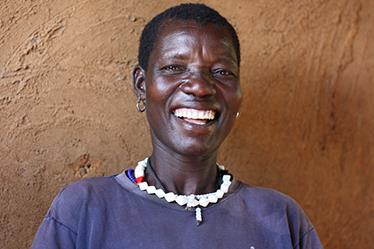Schools without walls
The purpose of FFS is not only to build the technical capacity of farmers but also to contribute to community development including gender equality and social inclusion.

Christine, a participant in the Farmer Field School in Karamoja, Uganda, is now a source of knowledge for other people in her village. ©FAO/Lucie Chocholata
Smiley and energetic, Christine lives in the semi-arid region of Karamoja in north-east Uganda. Her husband passed away some time ago and she is now taking care of her six children on her own. Christine struggled in managing her household and securing the basic needs for her children. “I was permanently asking somebody for something,” she describes.
Agriculture had always been the main source of her limited income. “Farming was difficult,” she explains. “Sometimes I found myself without seeds when the rains came. And people were not very willing to support me because I would have difficulties to pay them back.”
Christine joined her Farmer Field School (FFS) group in 2011. “Through FFS, I not only learnt how to better manage my activities, but also how to understand the right timing for sowing, how to use fewer seeds with the same final outcome and how to set up a marketing strategy,” says Christine.
Farmer field schools are schools without walls. They are centered on the concept of hands-on learning with the goal of building on farmers’ skills and enhancing their capacity to critically analyse and solve local agricultural challenges. In FFS, farmers are the experts. It is the farmers who decide what is relevant to them and what they want the FFS to address in their curriculum. This ensures that the information is relevant and tailored to the participants’ actual needs. The FFS promote the idea that learning is unique to each person and that, in order to promote new learning, prior experience must be taken into account.
